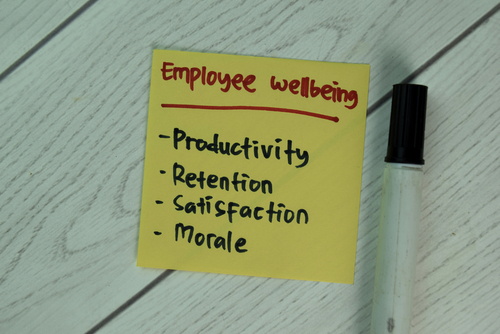In the rapidly evolving landscape of modern business, success is no longer solely defined by bottom-line profits and market share dominance. A new era has dawned—one in which organizational success is intimately intertwined with the well-being of its most valuable asset: its employees. This paradigm shift has ushered in an era of enlightened employers that recognize that the path to sustained success is paved with a genuine commitment to employee well-being.
This article explores the multifaceted benefits of prioritizing employee well-being and the strategic approaches that empower organizations to achieve unprecedented heights of success, fostering a resilient workforce.
Embracing the Holistic Well-Being Paradigm
Gone are the days when employee well-being merely revolved around healthcare benefits and annual checkups. The concept of well-being has transcended traditional boundaries, evolving into a holistic philosophy that encompasses physical, mental, emotional, and even spiritual wellness. Organizations that embrace this paradigm shift signal their commitment to fostering a work environment that nurtures employees on every level of their being.
The Power of Well-Being in Driving Organizational Success
Amplified Employee Engagement and Productivity
At the heart of a well-functioning organization lies an engaged and motivated workforce. Robust well-being initiatives, encompassing everything from fitness regimes to stress management workshops, fuel employees’ motivation and resilience. This translates into higher job satisfaction, diminished absenteeism, and a significant boost in overall productivity.
Magnetism for Top Talent and Enhanced Retention
In today’s fiercely competitive job market, employers vying for top talent can no longer rely solely on traditional perks. Holistic well-being programs have emerged as a key differentiator, showcasing an organization’s genuine commitment to employee growth, work/life balance, and overall well-being.
Transformed Organizational Culture
A culture that places paramount importance on employee well-being fosters an atmosphere of collaboration. When employees are supported and valued, they become more inclined to freely exchange ideas, communicate transparently, and pioneer innovative solutions. The result is a resilient workforce that thrives not only individually but also collectively, cultivating an authentic and inclusive organizational culture that drives success from within.
Resilience and Agility in the Face of Challenges
Amid today’s unpredictable business landscape, resilience is a prized attribute. Well-being programs arm employees with essential tools to navigate stress, achieve work/life harmony, and bolster their resilience, ensuring they remain adaptable and agile in times of change.
Mitigated Healthcare Expenditures
Forward-thinking well-being programs have a direct impact on employees’ health outcomes, significantly curbing healthcare costs. By identifying and mitigating risk factors and promoting healthy lifestyles, organizations realize substantial cost savings while safeguarding their employees’ well-being.
Strategies for Prioritizing Employee Well-Being
Holistic Well-Being Programs
Employers and HR professionals should consider shaping all-encompassing well-being initiatives that cover a spectrum of essential aspects, including physical health, mental wellness, emotional intelligence, and personal growth. Well-being offerings can be elevated by incorporating a variety of resources that empower employees from every angle. From invigorating wellness retreats that provide a rejuvenating escape from routine to synchronous and asynchronous programs designed to cater to diverse schedules and preferences, these initiatives foster holistic growth. By embracing this multifaceted approach, an ecosystem that not only supports employees in their individual journeys to well-being but also unites them in the collective pursuit of vitality and fulfillment is created.
Inspirational Leadership
The cornerstone of fostering a well-being-centric culture rests upon leadership that sets the tone through personal example. When leaders prioritize their own well-being, they become powerful role models, motivating employees to adopt and integrate healthy habits into their lives. To establish this culture, programs like executive consulting and management training prove invaluable. These initiatives empower employers to experience the benefits of well-being firsthand, enabling them to advocate for wellness initiatives among their teams. By committing to leadership development from within, these programs facilitate the growth of a resilient organizational culture that prioritizes the well-being of individuals and the entire company.
Moreover, these offerings equip leaders to understand the intrinsic value of wellness programs not only for employee health but also for their own professional growth. This comprehensive approach ensures well-being isn’t just a buzzword but an integral part of a company’s DNA, enriching its overall health and long-term viability.
Championing Organizational Success Through Employee Well-Being
Organizational success is unequivocally linked to the well-being of its workforce. Prioritizing employee well-being isn’t a transient trend; it’s a strategic imperative that reshapes organizations’ destiny. By nurturing an environment that honors employees’ physical, mental, and emotional health, organizations sow seeds of prosperity that ripple across every facet of their operations.
An unwavering commitment to employee well-being yields exponential dividends, from heightened engagement and productivity to enhanced attraction and retention of top talent. It’s a holistic approach that drives organizational culture, enhances resilience, and ultimately shapes an organization’s narrative of success.
The path to organizational success through employee well-being is paved with intention and dedication. As the business landscape continues to evolve, enlightened organizations understand that investing in their employees’ holistic well-being is the compass that guides them toward not just surviving but also thriving.
Amanda Rieger Green, founder of Soul Pathology, is a globally recognized psychic medium, spiritual intuitive, and wellness advocate with over a decade of experience. She empowers clients to harness their innate abilities, blending spirituality, psychology, and healing practices for transformative growth. She also holds a master’s degree in public health and is a certified yoga instructor and reconnective healing practitioner.

